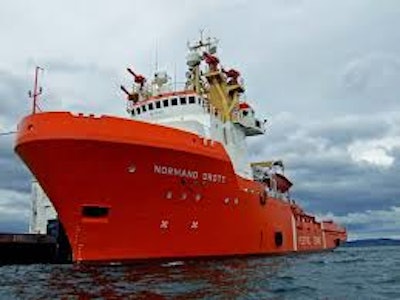
 PORTLAND, Ore. (AP) — An environmental assessment for a proposed oil-by-rail terminal in Vancouver, Washington says the project could have negative consequences for endangered salmon and other fish in the Columbia River.
PORTLAND, Ore. (AP) — An environmental assessment for a proposed oil-by-rail terminal in Vancouver, Washington says the project could have negative consequences for endangered salmon and other fish in the Columbia River.
The study, released Tuesday by Washington state's Energy Facility Site Evaluation Council, says the number of vessels added to pick up oil at the terminal could lessen water quality, induce bank erosion, reduce shoreline and wetland vegetation and harm essential fish habitat. It would also lead to the destruction of some archaeological resources located along the shoreline.
If the terminal was permitted, the river's annual ship traffic of about 1,500 vessel trips per year would nearly triple.
"The increase in deep-draft vessel traffic associated with the proposed facility could result in a moderate to major long-term effect on near-shore fish including listed salmonids and eulachon species in the lower 33-mile portion of the Columbia River," the assessment says.
Wakes from the ships could wash juvenile salmon onto the shore, leaving them stranded — a moderate to major impact, according to the study. Stranding would occur in the lower Columbia where shorelines are not shielded from wave action. The area contains some of the highest quality shallow-water shoreline habitat.
The vessels could also suck in aquatic larvae and eggs, which would hurt fish reproduction, population size, or distribution of fish and reduce species such as salmon, especially during vulnerable times such as extremely high temperatures.
Other concerns include soil liquefaction under the proposed facility in case of a large earthquake and impacts to rail transportation in the region, including shipment delays and delays at crossings. The project could also increase train-wildlife collisions.
Another concern is local oil spill responsiveness: many local firefighters aren't trained and equipped to respond to a train derailment with resulting oil spill and fire, and have no access to oil spill containment equipment, the study says.
The $210 million project by Tesoro Corp. and Savage Cos. would be the Pacific Northwest's largest oil train terminal. It would receive an average of 360,000 barrels of Bakken crude per day by rail, store it and transfer it to ships for delivery to refineries along the West Coast. Vancouver is just across the river from Portland, Oregon.
The crude would be transported by unit trains composed of up to 120 tank cars. An average four unit trains per day would roll along the river and to the terminal. Most of the crude would arrive from the Bakken formation in North Dakota, Montana, and Canada.
The project has faced intense opposition because of recent accidents involving oil trains. In July 2013, a runaway oil train derailed and exploded in Lac-Megantic, Quebec, killing 47 people.
Critics are concerned about potential oil spills and explosions, and other environment and safety risks.
"The study demonstrates one thing: Tesoro's oil trains and shipping terminal are too dangerous," said Brett VandenHeuvel, executive director of Columbia Riverkeeper.
Port and company officials have said the project would be an economic boon to the community and that safety is a priority for them. All tank cars used to transport oil to the terminal would be required to meet the new standards issued earlier this year.
Tesoro officials say the environmental study is an important milestone for the project. Tesoro declined to comment on specific issues raised by the assessment.
"We are currently reviewing the document and will be able to address specific issues and respond to more detailed questions over the coming weeks," said Tesoro spokeswoman Tina Barbee.
The public can comment on the assessment until early January. After a review, state officials will make a recommendation to Gov. Jay Inslee, who has the final say on the project.






















